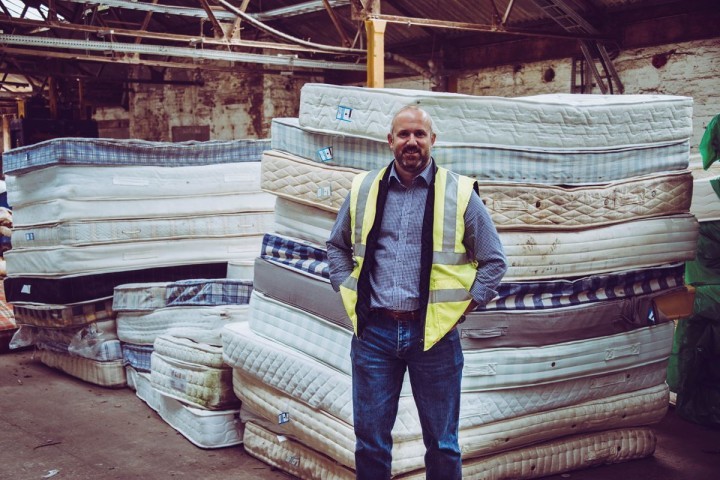You can sense some frustration in Nick Oettinger’s voice as he talks about the circular economy. “There’s a real misconception around the term,” he says. “People focus on the ‘circular’ but don’t understand the ‘economy’ bit.”
He explains: “It is about finding value in materials – if there is value it will be used. So before you build something, make sure it has value once its life is over.
“If you are putting in a material that no-one will want then don’t – use something else.
“If you took it straight out once you’ve built the product, what would it be worth? If the answer is ‘nothing’, go and find a different material.”
That message about utilising renewable products that can create commodity value further down the line is one that he continues to promote both to his clients and the wider business world.
Nick, who lives in West Lancashire, is a well-respected circular economy economist and something of a pioneer. The Furniture Recycling Group (TFRG) he has created, which is headquartered in Blackburn, provides mattress recycling and mattress refurbishment solutions to industries across the UK.
This includes full logistics and material handling services, creating a circular economy for mattresses and their component parts as a sustainable alternative to landfill.
The company has recycled more than 3.5 million mattresses since 2012, and currently recycles 16,000 mattresses and rejuvenates more than 2,000 every week.
It has grown from Nick working on his own in small premises in Preston to a business that employs 140 people, with recycling facilities in Blackburn, Bolton and Derbyshire and a turnover approaching £8m.
Nick got the idea for the business when he saw an old mattress stuck under the wheels of a truck on a landfill site with its springs wound round the drive shaft. He says: “I thought, ‘that’s metal’ and started wondering how it could be extracted so it didn’t go into landfill.”
He worked at home, taking mattresses apart to see what was in them, before setting up the business. Its first delivery was a single mattress from a Preston furniture company.
The material TFRG recycles is used in a variety of ways, including creating automotive felt and carpet underlay. The metal extracted goes to foundries to be used again.
Nick says businesses are now becoming more aware of the importance of building value into their products. It is a conversation he continues to have with the industry he works with.
He says: “It is high on their agendas and we are being asked to look at a product and if it can be recycled.
“The role of sustainability managers has changed from box ticking. They now sit on boards as sustainability directors with a loud voice that is listened to and that has been a very big change.
“Design teams are looking closely at the materials and what can be done with them at the end of life.”
He also points to the government’s introduction of the Extended Producer Responsibility (EPR) scheme, where producers are given significant responsibility for the treatment or disposal of post-consumer products.
As well as its recycling operations, Nick sees further growth in his company’s industry-leading rejuvenation service.
This was created to meet the challenge posed by the online growth of ‘sleep trials’ and ‘comfort night guarantee’ offers, where customers can return their mattress after a certain number of days.
The sanitation process created by TFRG uses bespoke designed, automated machinery to transform returned mattresses to nearly new condition to be resold.
The business says it offers an answer to the £60m annual blow that retailers encounter from the 600,000 mattresses returned under the comfort night guarantee.
More than 70 per cent of the returned mattresses sent to TFR Group are rejuvenated and returned to retailers for resale, allowing them to reclaim significant losses.
So far more than 200,000 have been rejuvenated returning over £40m of revenue back to them.
Nick says: “The rise in online sales isn’t just in the UK, the ‘comfort night guarantee’ has become a standard consumer expectation worldwide. The challenge of product returns is a global issue that retailers from all corners are facing, underscoring the need for a universal solution.
“With this in mind, we are exploring opportunities to expand into European markets and beyond, aiming to tackle the global problem of mattress returns head-on.”
While TFRG continues to expand its operations there is still a long way to go. Nick says: “Seven to nine million mattresses are thrown away every year. If you put them in Wembley Stadium, you’d fill it two to three times over. That is that landfill capacity we are using every year for mattresses.”
Looking at the wider circular economy he adds: “You can recycle and repurpose almost anything but people won’t because it doesn’t make commercial sense.
“It is a very simple equation. Put the cost of collecting and recycling against the revenue from the commodity value and the charge for someone to take it on. Follow the money.”
Enjoyed this? Read more from Ged Henderson






















